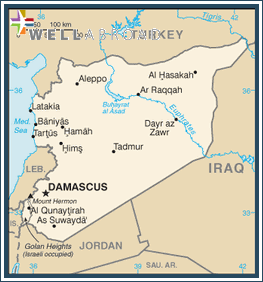|
MOST RECENT ALERTS
There's no recent alert.
|

|
|||||||||||||||
| COUNTRY OVERVIEW | ||||||||||||||||
|---|---|---|---|---|---|---|---|---|---|---|---|---|---|---|---|---|
|
| COUNTRY GENERAL INFORMATION | |||||||
|---|---|---|---|---|---|---|---|
| Language: |
Arabic (official); Kurdish, Armenian, Aramaic, Circassian widely understood; French, English somewhat understood |
||||||
| Currency: | Syrian Pournd (SYP) | ||||||
| Predominant Religions: |
Sunni Muslim 74%, Alawite, Druze, and other Muslim sects 16%, Christian (various sects) 10%, Jewish (tiny communities in Damascus, Al Qamishli, and Aleppo) |
||||||
| National Holidays: | Independence Day, 17 April (1946) | ||||||
| Economic Status: |
Syria has a developing, centrally-planned economy with large public (30%), agricultural (25%), and industrial (20%) sectors.
|
||||||
| Security: |
Syrian Armed Forces: Syrian Arab Army (includes Syrian Arab Navy), Syrian Arab Air and Air Defense Force (includes Air Defense Command) |
||||||
| US Presence: | |||||||
| Document Requirements: |
A passport and a visa are required. Visas must be obtained prior to arrival in Syria from a Syrian diplomatic mission located in the traveler’s country of residence, although the Syrian visa policy with respect to American diplomats and citizens is currently under review. Foreigners who wish to stay 15 days or more in Syria must register with Syrian immigration authorities by their 15th day. Syrian-American men or American men of Syrian origin, even those born in the United States, may be subject to compulsory military service unless they receive a temporary or permanent exemption from a Syrian diplomatic mission abroad prior to their entry into Syria. (Please see the section on Special Circumstances below.) Syria charges a departure tax for all visitors except those on diplomatic passports. As of July 1, 2008, the tax is 1,500 Syrian Pounds (~$32) if departing from the airport or 500 Syrian Pounds (~$13) if departing via one of the land borders. The Syrian government rigidly enforces restrictions on prior travel to Israel, and does not allow persons with passports bearing Israeli visas or entry/exit stamps to enter the country. Syrian immigration authorities will not admit travelers with. Likewise, the absence of entry stamps from a country adjacent to Israel, which the traveler has just visited, will cause Syrian immigration officials to refuse admittance. Entry into Syria via the land border with Israel is not possible. American-citizen travelers suspected of having traveled to Israel have been detained for questioning. Syrian security officials are also sensitive about travel to Iraq. There have been instances in which Americans, especially those of Arab descent, believed to have traveled to Iraq were detained for questioning at ports of entry/exit. Americans seeking to travel to Iraq through Syria have also on occasion been turned around and/or detained. On a number of occasions the border between Iraq and Syria has been closed without notice, stranding Americans on either side of the border. A child under the age of eighteen whose father is Syrian or of Syrian descent must have his/her father’s permission to leave Syria, even if the parents are separated or divorced and the mother has been granted full custody by a Syrian court. Women in Syria are often subject to strict family controls. On occasion, the families of Syrian-American women visiting Syria have attempted to prevent them from leaving the country. This can be a particular problem for young single women of marriageable age. Although a woman does not need her husband's explicit consent every time she wishes to leave Syria, a Syrian husband may take legal action to prevent his wife from leaving the country, regardless of her nationality. Once such legal orders are in place, the U.S. Embassy cannot help American citizens to leave Syria. Visit the Embassy of the Syrian Arab Republic, 2215 Wyoming Ave. NW, Washington, DC 20008, telephone (202) 232-6313 or check the Syrian Embassy's home page at the Syrian Embassy's home page for the most current visa information. Some HIV/AIDS entry restrictions exist for visitors or foreign residents of Syria. There are no special immunizations required for entry to Syria. AIDS tests are mandatory for foreigners of ages 15 to 60 who wish to reside in Syria. The AIDS test must be conducted in Syria at a facility approved by the Syrian Ministry of Health. A residence permit will not be issued until the absence of the HIV virus has been determined. Foreigners wishing to marry Syrian nationals in Syria must also be tested for HIV. Syria usually will not give visas or residency permits to students wishing to study religion or Arabic in private religious institutions. Please verify this information with the Embassy of Syria before you travel. Information about dual nationality or the prevention of international child abduction can be found on our web site. For further information about customs regulations, please read our Customs Information sheet. |
||||||
| Major Airports: |
Airports: 92, Airports w/paved runways: 26 |
||||||
| Servicing Airlines: |
|
||||||
| Risks and Precautions: |
This Travel Warning warns U.S. citizens of ongoing safety and security concerns in Syria. American citizens are urged to consider carefully the risks of travel to Syria and to take adequate precautions to ensure their safety. This supersedes the Travel Warning for Syria issued on April 15, 2008. |
||||||
| Mortality Statistics: |
Infant MR total: 28.61 deaths/1,000 live births |
||||||
| Immunization Indicators: |
Required: None
|
||||||
| Infectious Disease Concerns: |
HIV/AIDS– people living with HIV/AIDS: less than 500 |
||||||
| Overall Quality of Medical Services: |
Basic medical care and medicines are available in Syria's principal cities, but not necessarily in outlying areas. Serious illnesses and emergencies may require evacuation to a Western medical facility. |
||||||
| Providers in Network: |
|
||||||
| Recent Medical Threats/ Concerns/Warnings: | |||||||
| Communications Info: |
Country Code: +963 |
||||||






